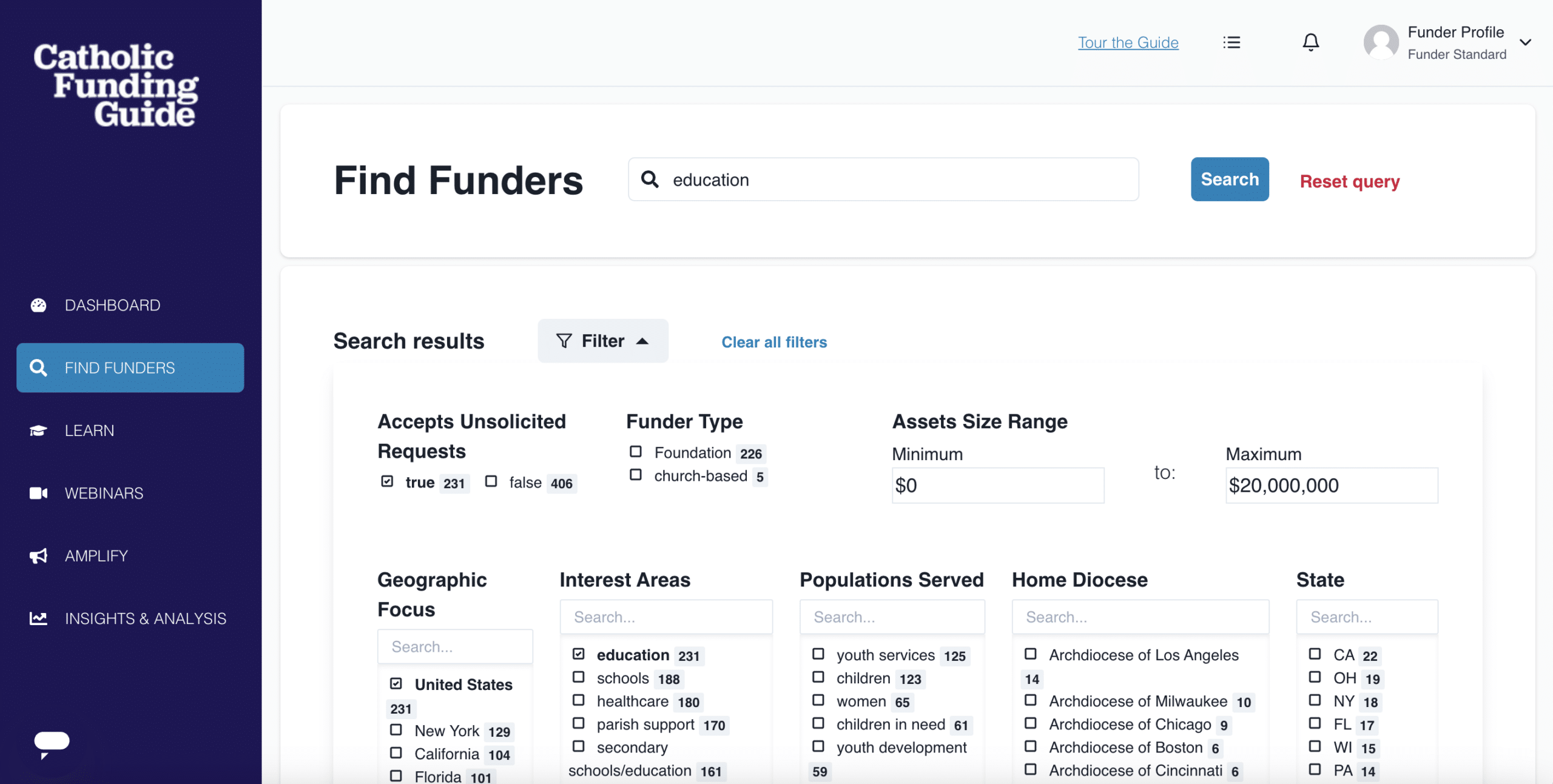Do’s for Meeting with a New Funder
- Do Your Homework Before the Meeting
Set yourself up for success by taking the time to prepare before your meeting, familiarizing yourself with the foundation or donor. Some possible resources include their website, annual reports, and other publications. Take note of any deadlines, requirements for funding, or other self-stated preferences. Additionally, learn about their giving history to get a sense of how they typically give. Look for any potential connections to the funder through board members or others involved with your organization. This information is often captured within the Catholic Funding Guide.
With this information in mind, be prepared to present and share your work with the funder in light of their priorities and giving preferences. Remember that the meeting with them will help both of you determine if your missions, priorities, and financial needs are aligned.
- Make a Good First Impression
The day of the meeting has arrived. How do you start it off on the right foot? While most of these tips are common sense, it never hurts to review best practices.
- Arrive on time. Plan to be a few minutes early and then give yourself extra time to account for traffic, construction, or other unanticipated delays. If going to an unfamiliar place, research parking and other important information.
- Dress professionally. Consider the meeting location and the reputation of the funder to decide the proper attire. When in doubt, business attire is a safe choice.
- Express your gratitude. Be sure to thank the funder for meeting with you. The beginning and end of the meeting are opportune times to do this. It also is a good idea to connect with them after the meeting to reiterate your thanks. A handwritten note is considered best practice, however, consider your relationship with the funder before deciding the best communication method.
- Virtual meeting? Check your background. It is ideal to have a clean, professional background and adequate lighting to avoid distractions during your meeting. You should also remember to double check your camera and microphone prior to the call to ensure they are functioning correctly.
- Ask for clarification. If you have any questions regarding how to pronounce a name or how to address the funder, respectfully ask. Clarifying this up front can prevent a faux pas during your meeting.
- Make a Personal Connection
The goal of your meeting is to start a relationship with the funder. Strive to connect with them as individual people, albeit in a professional setting. Facilitating an engaging, uninterrupted conversation is part of that. If you have another commitment or a set time you need to leave, mention it up front. You may want to ask the funder as well to ensure the most productive meeting possible.
Be present for the conversation. Avoid checking your phone or watch, and ensure all electronic devices are silenced. If you are meeting virtually, silence any notifications and don’t check your email.

Ask questions about their personal preferences, especially as it regards staying in touch. How do they prefer to communicate? Would they be interested in receiving your organization’s newsletter? If so, do they prefer a hard copy or email version (if you have both available)?
- Keep Your Shared Mission in Mind
Remember that the purpose of this meeting is not only to obtain funding for your organization’s mission, but is equally to help the funder carry out their mission. With that in mind, prepare questions ahead of time to learn more about their perspective. You might ask:
- What are the steps in grant review and approval within the foundation, and how will the grant be monitored?
- Based on what I’ve told you so far, do you think an application would be appropriate?
- Can you advise me on the appropriate amount for a grant request?
- Are there other considerations or preferences within your organization that we should know about?
While you are likely eager to share all about your important work with the funder, be prepared to listen as much as you talk, gaining a deep understanding of your funder’s mission and goals.
- Have a Strategic Plan & Clear Objectives
Take time to prepare your case before the meeting. Know how to clearly present the need your organization strives to address; share your strategy; and confirm how you plan to measure your results. You should have your budget and other details available in case the funder asks questions.
Don’ts for Meeting with a New Funder
- Don’t Try to Force Your Project or Organization to Fit the Criteria
After thoroughly researching the funder, you may have a pretty good idea of what they do and do not support. Your project should clearly fall within the funding priorities. If you have to provide a lengthy explanation for how the project meets the criteria, perhaps that isn’t the best project to present. You may want to choose a project that is more obviously in line with the funder’s priorities.
- Don’t Be Afraid to Ask Who Else to Talk With
Regardless of whether the funder turns out to be a good fit for your organization, you should make a point to ask the funder if they know of anyone else who might be interested in your work. Through their network, they may know of other resources that would benefit your organization, groups you could partner with, or funders who may wish to support your organization. Understand that funders may wish to consult their contacts before connecting you with them.
- Don’t Over- or Undervalue Your Data
Sharing information about why your work matters and how you will carry out your project is important, and data can help with that. But thoughtfully consider the amount and types of data you share with funders. Be cautious to not overwhelm with too much information, as this can cause your presentation to be confusing or disjointed. At the same time, beware of providing too little data, as this may cause gaps in understanding or a lack of support for the claims made.
- Don’t Make Assumptions
Don’t assume that funders are familiar with your organization or your field. Be sure to provide a brief introduction to your organization, including its mission and history. Your goal is to build trust and confidence, sharing why your organization is uniquely positioned to make a difference in their interest area. Recognize that the funder may not be familiar with your field and avoid the use of industry jargon.
- Don’t Forget to Establish Your Budget
Finally, come prepared with an accurate budget. Make an effort to ensure it is as realistic as possible. Although you may be tempted to alter the budget based on the funding history of the funder, it is best to be open and honest with the funder to set your partnership up for success. If the project will require more funds that the funder can provide, perhaps they can connect you with other funding sources. If it is a smaller project than the funder usually supports, be clear about that too.
Read more about how to prepare for and conduct donor meetings.



